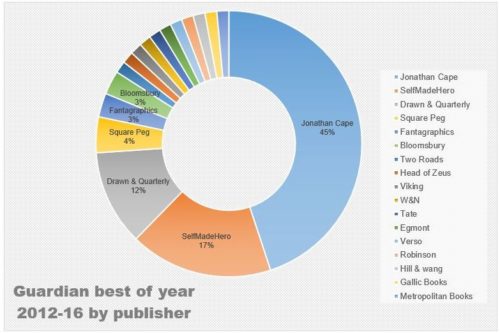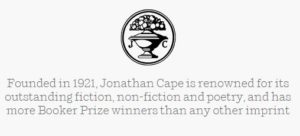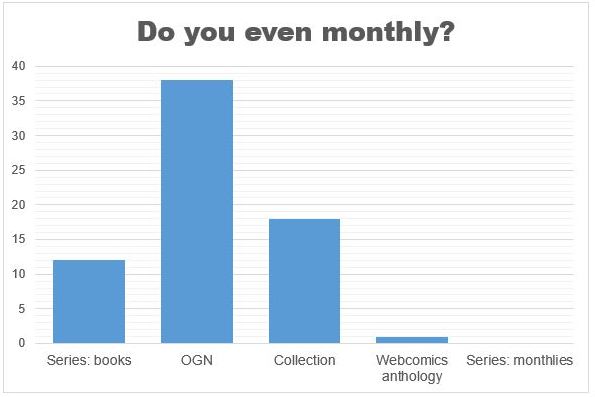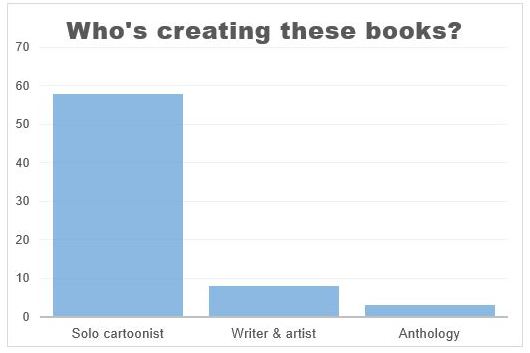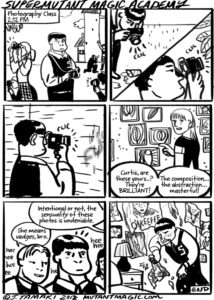Well, damp sack of Krampus, 2017 has sucked, huh? But it turns out that in between the crying and general existential dread, comics creators have still found time to pen responses to the rising ambient horror, or delightful escapes from it.
We've been on hiatus for a while, and there's no best-of podcast this year. But apparently Roger wrote his 2017 list anyway. Muscle memory or something, we don't know.
Anyway, here's a quick roundup of the books we really, really liked, out of the reading we did get round to in 2017
Pantheon - Hamish Steele
Mythopoeia with the mind of a smutty schoolboy. Calling this an irreverent retelling of Egyptian myth doesn't quite cut it. This book is a big daft delight.
The art style is this brash, side-on valley-of-the-kings-papyrus pastiche, via Saturday morning cartoons (leading to an amazing visual gag), and it covers the (mis)adventures of the ancient pantheon. From Atum wanking the world into being to the rise of man.
It helps that the source material really is that weird - this is a well-researched piece, and also the funniest thing I have read in years. Pantheon has pitch-perfect comic timing and a real ear for change-of-register gags.
Livestock - Hannah Berry
You know how we mentioned that the world is like a special recursive trash fire somehow made of other trash fires? This is a response. An indignant howl at the sickness of where we might be headed and the injustices of quite how.
A government department just let slip that they quietly legalised human cloning in a PFI blunder, and are now trying to clear up their mess. The public of course are more interested in the antics of suspiciously squeaky-clean, childlike, and on-message pop star Clementine Darling.
Livestock really lets its world emerge, without ever feeling quite hectoring or overly on-the-nose. It's interspersed with social media splashes and tabloid fragments, and it opens deep in its own celeb-culture narrative, letting the reader slowly realize (and want to scream at its characters for not caring about) what's going on. It's brilliantly constructed.
Hannah Berry's visual style here is soft, really letting the faux-cheery plastic monstrosity of it all unwind as you read. It's things astonishingly loudly unsaid, around completely plausible cynicism. It's media manipulation, energy companies lionized like sports teams, people like fungible meat. Read it with a stiff drink, but read it.
Something City - Ellice Weaver
Beautiful life-vignettes in a colourful pseudo-pace. Ten intertwined stories in a strange city. We reviewed it here, and enjoyed it tremendously.
In particular, Weaver's visual style here feels really fresh. Layered-up screen prints give a feels that's both blocky/architectural and loose and casual. Again, check out the review for a bit more.
The Backstagers - James Tynion (writer), Rian Sygh (artist)
Actually lovely. You entirely can do sincere charm while winking to the reader a little and this does that. Who'd look backstage at a high school drama club? Surely the techies and prop makers couldn't be up to anything as interesting as the actors?
Yeah, so, obviously there's an interdimensional portal to a world of confusing wonder and mild peril that must be kept at bay by endearing misfits. And such endearing misfits. Did I mention lovely? Backstagers is warm and kind, and kinda queer and inclusive. It's got a cartoony feel occasionally breaking into intricacy, and really good use of light. We did a podcast on what feels like a new wave of sincerity and this was front and centre in my picks.
Spinning - Tillie Walden
Tillie Walden excels at filling little spatial scenes with emotion and felt life. Her figure skating memoir is no different. Changing high schools, the pressure of competition, coming out and finding first loves, it's all there with her charged use of light and shade, and the movement of space around her.
Godshaper - Simon Spurrier (writer), Jonas Goonface (artist)
It's a neo-dustbowl bluesman future future. Technology doesn't work, and money doesn't exist, but everybody has their own personal god. Or almost everybody. Also, the colours are gorgeous.
Spurrier has a history of bloody nailing high concept and this is no exception.
It's the story of Ennay, a "godshaper" - a pariah with no god of his own, but the ability to shape the gods of others, and Bud, a god (fittingly) without a person. Also: a kind of weird fantasy skiffle/blues/something alt music genre, mobsters, pansexual nomads, and beautifully, gloriously weird visuals. A little bit like Carnivàle but funny and not relentlessly depressing.
Things everybody else thinks are great but we haven't read yet
Well, if anyone wants to buy us presents...
- The Interview - Manuele Fior
- Generational change against first contact with aliens.
- Boundless - Jilian Tamaki
- Short stories. Identity. Culture.
- You & a Bike & a Road - Eleanor Davis
- Cross-country bicycle travelogue.
What? Of course it's just Zainab's list.
Still good!
The series we already loved and have carried on loving this year:
- Injection - Warren Ellis (writer), Declan Shalvey (artist), Jordie Bellaire (colours)
- Harrow County - Cullen Bunn (writer), Tyler Crook (artist)
- Paper Girls - Brian K Vaughan (writer), Cliff Chiang (artist)
- Black Monday Murders - Jonathan Hickman (writer), Tomm Cocker (artist)
- The Unbeatable Squirrel Girl - Ryan North (writer), Erica Henderson (artist)
Other lists
Don't just take our word for it. Look:
- Broken Frontier's 2017 awards
- Gosh Comics' 2017 list
- Zainab Akhtar's list of comics to watch out for, from January
- For a change, the Guardian's list isn't just this year's Jonathan Cape release list
So, yeah, 2017 had some comics, huh. What did we miss? Can haz comments?







